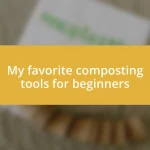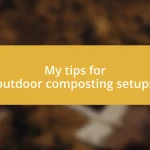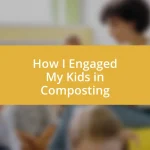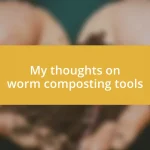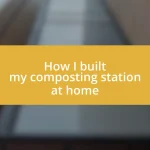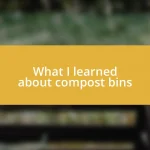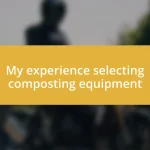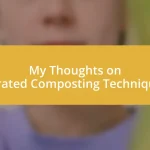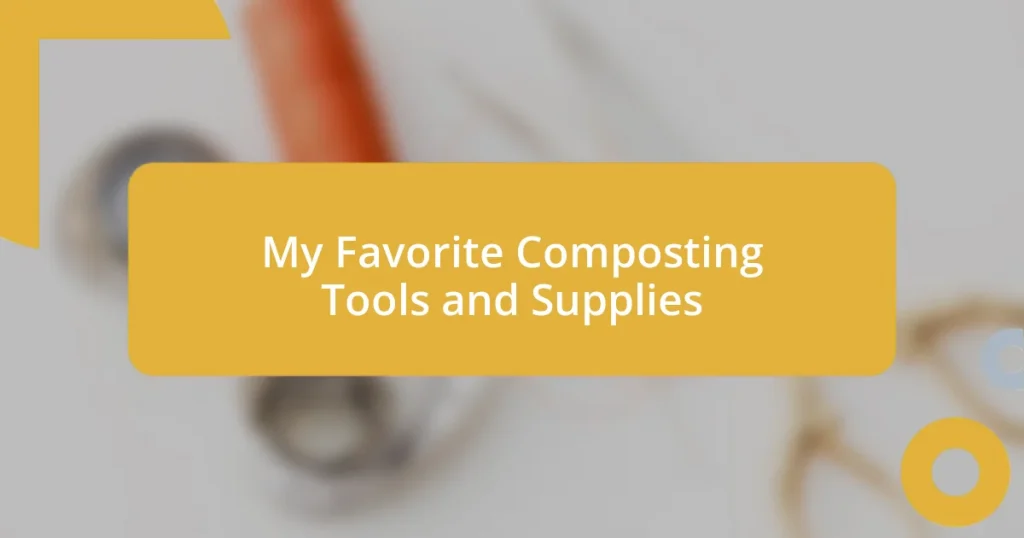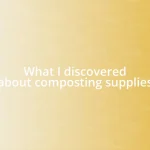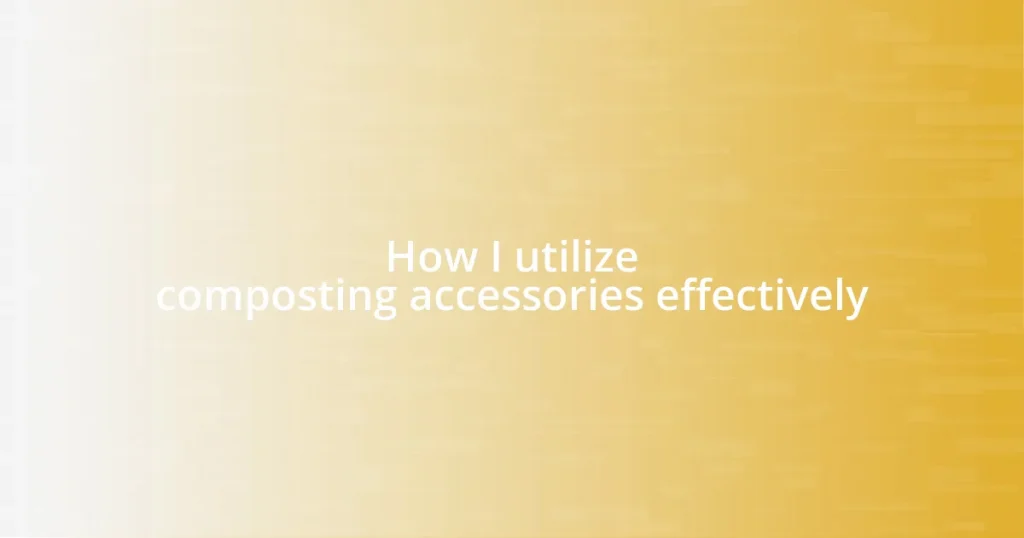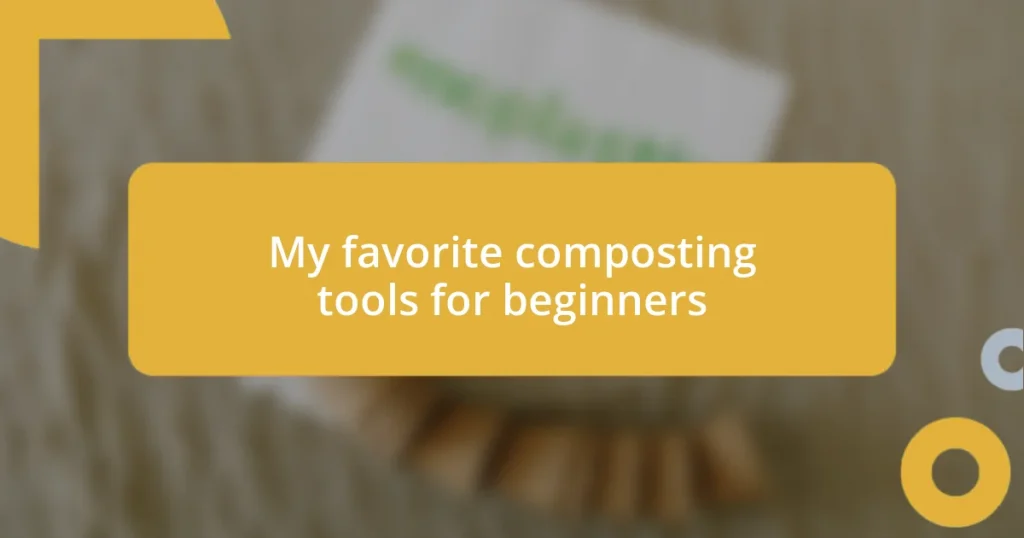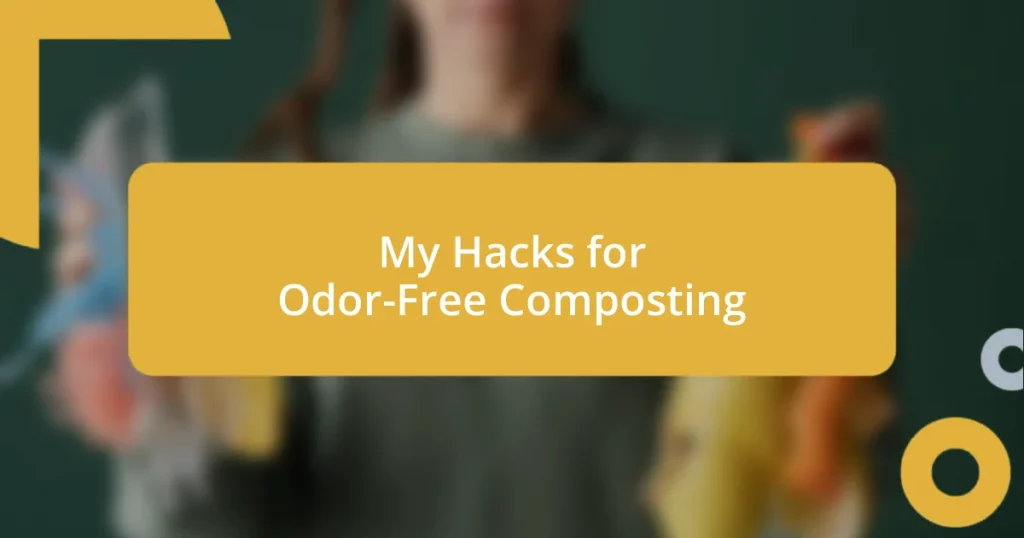Key takeaways:
- Having essential composting tools, such as a sturdy compost bin, pitchfork, and garden trowel, significantly enhances the composting experience and fosters a connection to the process.
- Choosing the right compost bin, like a tumbling or traditional bin, can boost functionality and convenience, making composting more enjoyable, especially for families.
- Regular maintenance of composting tools is crucial for efficiency; cleaning, proper storage, and using maintenance products extend the lifespan and effectiveness of the tools.

Introduction to Composting Tools
Composting tools are essential for anyone looking to create nutrient-rich soil and reduce waste. From my experience, having the right tools can make the composting process not just easier, but also more enjoyable. Have you ever thought about how satisfying it is to see scraps transform into something valuable?
When I first ventured into composting, I felt overwhelmed by all the options available. I quickly discovered that not every tool is necessary; rather, a few key supplies can really enhance the experience. A sturdy compost bin, for instance, became my best friend, keeping my compost contained and tidy while enabling efficient aeration—so important for the breakdown process.
As I collected my composting tools over time, I found myself connecting with the whole process. Each tool, from my pitchfork for aerating the pile to the small trowel for mixing in new materials, became a companion in my gardening journey. This emotional bond makes me wonder: how can simple tools turn a chore into a rewarding hobby?

Essential Composting Tools List
When it comes to composting, having the right tools can truly make all the difference in your experience. I’ve found that certain essentials are not just helpful—they can be genuinely uplifting. For instance, a good quality compost bin changed the game for me. It felt like having my own little eco-system right in my backyard! The structure not only helped to organize my materials but also allowed for better airflow, accelerating decomposition.
Here’s a focused list of essential composting tools that I believe can enhance your journey:
- Compost Bin: A sturdy bin to contain your materials and promote aeration.
- Pitchfork or Compost Aerator: Great for turning and mixing the compost pile to speed up the breakdown process.
- Garden Trowel: Perfect for digging and adding new scraps into the pile.
- Bamboo or Plastic Compostable Bags: Handy for collecting kitchen scraps before adding them to your compost.
- Thermometer: Helps you monitor the internal temperature to ensure the compost is breaking down effectively.
- Hand Gloves: Protects your hands while handling organic waste and compost.
- Screen or Sifter: To help separate finished compost from unfinished materials.
Each of these tools has carved out a unique role in my composting adventure, bringing both utility and joy to the process. What surprised me most was how even small items, like gloves, made me feel more connected to the earth as I worked.

Best Compost Bins for Home
When it comes to composting at home, I’ve personally found that the best bins strike a balance between functionality and convenience. One of my favorites is the tumbling compost bin. It’s fantastic because you can easily turn the compost by spinning it, which really speeds up the decomposition process. My children even enjoy helping with this part, turning composting into a family activity rather than a chore.
Another great option that I’ve used is the traditional bin style. It’s simply a sturdy container that can hold larger amounts of material. I remember feeling a sense of achievement when I filled mine for the first time; watching the mix of kitchen scraps and garden waste break down over time felt like creating my own little universe. Plus, it’s super easy to add new waste without any fuss.
Lastly, if you’re dealing with limited space, consider a compost tumbler or worm bin. Worm composting, known as vermicomposting, is surprisingly rewarding. I’ve had a worm bin on my balcony, and it’s brought me such joy to see the little guys doing their thing! The rich compost produced is incredible, and it fits perfectly into my urban lifestyle without taking much room.
| Compost Bin Type | Key Features |
|---|---|
| Tumbling Bin | Easy to turn, speeds up decomposition, fun for the family |
| Traditional Bin | Holds large amounts, easy access for adding scraps, visually satisfying |
| Worm Bin | Space-efficient, produces rich compost, engaging experience |

Recommended Compost Tools for Beginners
The first tool I highly recommend for beginners is a compost bin, as it’s essential for keeping your materials organized. When I first started composting, I was amazed at how much easier it became once I had a designated spot for all my scraps. I still remember the joy of opening the lid and seeing my waste transforming into nourishment for my garden—it’s like witnessing a tiny miracle every time!
Next on my list is a garden trowel; it’s surprisingly versatile. I can’t count how many times I’ve used it to dig a hole for my new vegetable plants after adding compost to the soil. This simple tool helps you mix in fresh compost, ensuring your plants get the nutrients they need right from the start. Isn’t it fascinating how something so small can have such a big impact on your gardening success?
Finally, I can’t emphasize enough the importance of a good thermometer. Monitoring the temperature of your compost pile was never on my radar until I tried it. It felt like having a backstage pass to my compost’s transformation! Seeing my compost’s temperature rise gave me a sense of accomplishment; it was proof that nature was doing its thing. If you want to get a more scientific edge in your composting hobby, I highly recommend getting one.

Advanced Composting Supplies for Experts
Advanced composting takes more than just a basic setup; it often requires specialized tools to really optimize the process. For instance, when I first invested in a compost aerator, I didn’t realize how much it would change the game. Picture this: sinking that tool into my pile and effortlessly introducing oxygen where it was needed most. Suddenly, my decomposition times sped up dramatically—like a breath of fresh air for my composting routine!
Another essential for serious composters is a quality sift. I remember my initial frustration when I discovered clumps hiding in my compost, making it less useful for my garden. Once I started using a sifter, though, it became a satisfying ritual. Watching those beautiful, dark granules separate from the rest as I sifted felt like unearthing treasure. Isn’t it such a joy to know exactly what’s going into your plant beds?
Lastly, I can’t stress enough the importance of using composting additives, such as microbial inoculants. The first time I applied them, I was skeptical, thinking, “Can this really make a difference?” But I took the plunge, and the results were astounding—my compost piled up faster, and the quality improved significantly! Seeing how happy my plants were with this nutrient-rich compost was like receiving a heartfelt thank you. Have you ever witnessed your efforts rewarded so beautifully? It’s moments like these that solidify my passion for composting.

Tips for Maintaining Composting Tools
Maintaining your composting tools is essential for a smooth and productive process. I’ve learned that regularly cleaning tools, like shovels and trowels, helps prevent the buildup of pathogens that could affect your compost. One day, after neglecting my garden fork, I noticed my compost didn’t seem as vibrant. A quick scrub made all the difference; it was like giving my tools a fresh start!
Another tip that’s often overlooked is to store your composting tools properly. I remember when I used to leave my tools scattered in the shed, and each time I needed something, it felt like a treasure hunt. Organizing them in a dedicated space not only saves time but also prevents rust and wear. It’s amazing how a little bit of organization can turn a chore into an enjoyable routine—you’ll actually look forward to using them!
Lastly, consider investing in tool maintenance products, like rust protectants or wood treatments for wooden handles. I recall the first time I applied oil to my trowel’s wooden handle; it felt as if I had breathed new life into it. Never underestimate the value of taking care of your tools; they’re your partners in this rewarding composting journey. Have you ever noticed how much easier a well-maintained tool makes the job? It’s proof that a little attention goes a long way in maintaining efficiency and effectiveness in composting!

Conclusion and Final Thoughts
As we wrap up our journey through my favorite composting tools and supplies, it’s clear that the right equipment can transform the composting experience. I still remember the sense of pride I felt when I first saw how much smoother my composting process became. Isn’t it a thrill to watch your efforts yield better results, just because you’ve equipped yourself with the right tools?
Choosing the tools that resonate with your style and needs is key. For me, each tool represents not just a convenience, but also a commitment to my gardening goals. In moments of frustration or doubt, I’ve found solace in my trusty compost aerator, which reminds me that even small improvements can lead to big changes. How do your favorite tools inspire you when challenges arise?
In the end, composting isn’t just about creating nutrient-rich soil; it’s also a fulfilling journey. By infusing our gardens with the right supplies, we nurture not just our plants, but our connection to nature. Reflecting on my experience, I see how each tool has its own story—like companions on this rewarding path. Do you feel the same connection with your composting tools?

